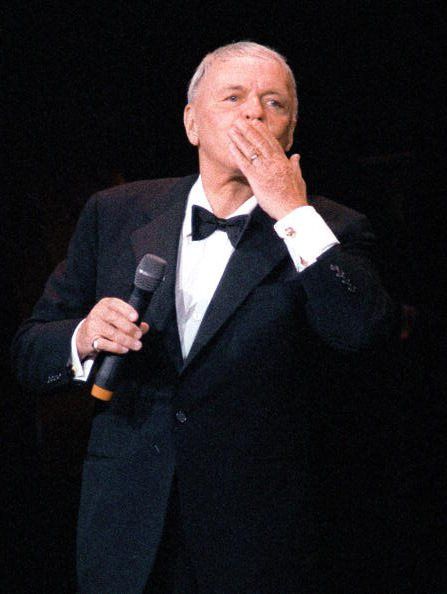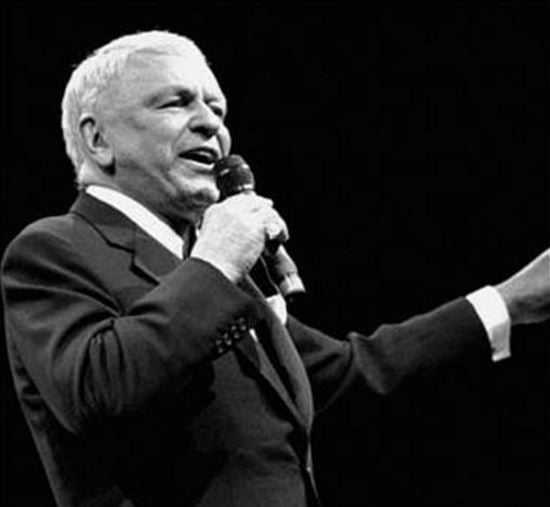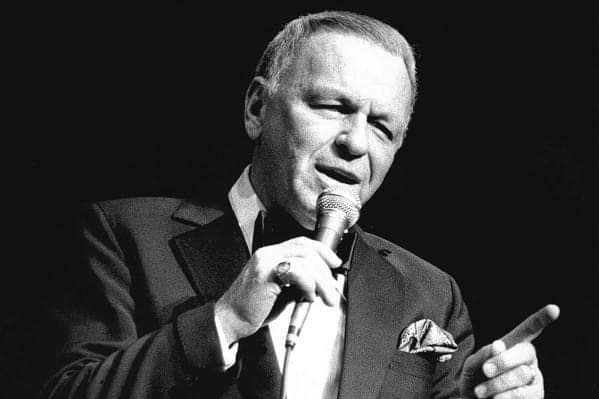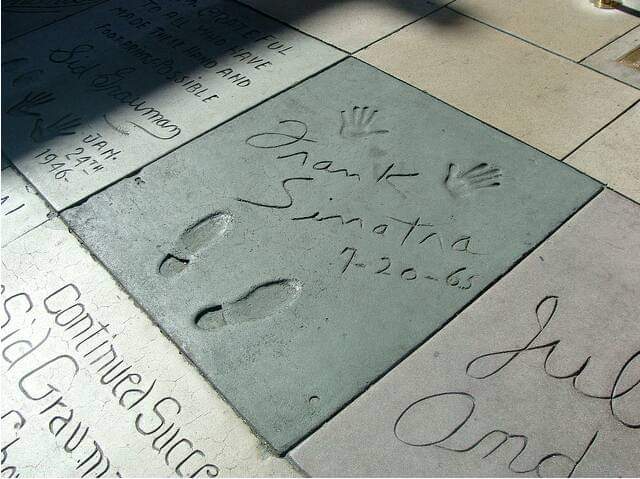
THE LAST YEARS OF FRANK SINATRA
EPISODE 3
By Mahnuel Muñoz
If in 1990 Frank threw himself into work to escape the death that took away some of the most important people in his life in a few months, from 1991 onwards the constant tours and professional commitments became a way to evade wars. intestines that destroy their family environment. It all began in 1976, when Frank married Barbara Marx. The marriage was not welcomed by the Sinatra family or some of his most intimate friends, who considered that Zeppo Marx‘s ex-wife was a careerist who married for economic interests. Since then, numerous incidents related to the management of the family assets aggravated the hostility between Frank’s wife and children, who was the main victim of the crossfire.
On January 13, Frank presents Quincy Jones with the Scopus award, awarded by the Hebrew University of Israel. This award is given to individuals or associations that stand out in their respective fields and whose humanitarian efforts and commitment contribute to Israeli and Jewish causes. Sinatra himself had received the award from Gregory Peck in 1976.
FRANK SINATRA RADIO
On January 23, the Diamond Jubilee Tour officially begins, which features the presence of married couple singers Steve Lawrence and Eydie Gormé, as opening acts and accompanists for Sinatra in a medley at the end of each concert. The choice of these artists is not very well received by music critics and initially not among the Sinatra family itself.
In March, “The Voice Of Our Time” is broadcast, a television special presented by singer Mel Tormé that covers the period between the beginning of Sinatra’s artistic career and 1965, when the celebration of his fiftieth birthday was a great event. media event. The space includes numerous fragments of films, television programs, songs and interviews. It is also worth highlighting the interventions of Sammy Cahn and Dinah Shore. Also in that month the School Of Art Institute of Chicago offers a film retrospective called “The Fascination Of Frank Sinatra”, in which ten of his films are broadcast.
Meanwhile, Sinatra continues to tour, inside and outside the United States. Critics praise Sinatra’s ability to challenge the limitations of his worn-out voice, rising to high notes and sustaining them like a person much younger and less “grounded” than he. On one of the international flights on the tour, the aircraft faces a series of strong storms that it cannot avoid as it is not prepared to fly over them. The plane passenger goes through endless moments of anguish, but Sinatra seems oblivious to the whole situation. He sits calmly with his glass of Jack Daniel’s in his hand.
THE LAST YEARS OF FRANK SINATRA
During a stay in Japan, in addition to offering two concerts at the Yokohama Arena, he recorded some advertising spots for the airline All Nippon Airlines. In the most striking of them Frank appears next to a large model of the Empire State Building, polishing a large red apple that he hands to King Kong himself. Upon returning to the United States, he offered five days of recitals at the Riviera Hotel in Las Vegas, sometimes giving two concerts a night. In an interview given to Goldmine magazine in those days, Nancy, concerned about her father’s hyperactivity, confesses her desire for him to retire to rest. The truth is that Nancy has reasons; To Frank’s memory and vision problems – the cataracts he has developed in both eyes prevent him from correctly reading the screens with the lyrics of the songs – is added a growing insecurity on stage. The presence of Steve Lawrence and Eydie Gorme is providential, as they remain attentive to the slightest hint of confusion on Sinatra’s part, discreetly take him by the arms and force him to move and sing with them. The Sinatra family had to change their negative opinion regarding the couple’s presence at concerts.
But without a doubt, the fundamental figure in the last years of Sinatra’s career is his son Frank Junior, in charge of the orchestral direction in the concerts since April 1988. Junior knows how to compensate for his father’s growing vocal deficiencies, adapting the orchestrations to make it easier for him to sing, and lifts his spirits when he is depressed. However, Sinatra does not show affection and gratitude to his son as he should. According to many witnesses, the relationship between the two is more similar to that of two co-workers than that of a father with his son. They greet and say goodbye with a handshake, and most disconcerting of all, Sinatra usually humiliates him in front of the audience. It is common that when making introductions, he gives him one of two things, saying first that he is “a very talented young man” and then blurting out that he is there because “his mother has asked me to look for him a job.” However, Junior endures all the outbursts of his grumpy old father and will be with him until the end.

On April 5, 1991, Sinatra participates in the “Welcome Home America” gala, a musical tribute that celebrates the fiftieth anniversary of the USO (United Service Organization, the entity responsible for caring for American military personnel and their families), as well as the recent victory in the Persian Gulf War. Actor Tom Selleck is in charge of introducing him to the audience, who receives him with a standing ovation. He offers a very emotional performance of “The House I Live In”, the conciliatory anthem that he recorded for the first time in 1945 for the short film of the same name, in which he appealed to racial and religious tolerance, at a time when such demands were sufficient. to be branded as a philo-communist. Although over the years Sinatra abandoned the Democratic ideology to support the Republican Party, he never left aside the humanitarian principles that always characterized him and that are above any political color; He continued fighting against all kinds of discrimination. On July 4, on the occasion of the commemoration of American Independence Day, he wrote in the New York Times:
“We are created equal! None of us are better than anyone else!
Why do innocent children still grow up to be despised? Why do hater jokes still get big laughs when delivered over the whispers of despicable people? You know who I mean, that bunch of people who say “Some of my best friends are Jewish, but…” As for the rest, those cross-burning fanatics for whom mental slavery is alive and well, I don’t envy your trials in the other world, where your thoughts, words and actions will be judged by a jury of One…
“I’m a bar singer, by definition. Even my mirror would never accuse me of inventing wisdom. But I do presume to have enough street smarts to know that hate is a disease, a disease in the body of freedom, which devours itself from the inside out, infecting all who come into contact with it, killing dreams. and hopes of millions of innocents with words, as accurately as if they were bullets.
Take a minute. Consider what we are doing to each other as we rob everyone and everyone of dignity and equality… Because if we do not confront this deadly disease of hate, intolerance, racism and anti-Semitism, we will soon destroy this blessed country from within…
Don’t just lip sync the lyrics of the song. Think about it, live it. “My country is yours, sweet land of freedom” (1). And when the music fades, think of the courage of Rosa Parks (2), who by a single act in a single moment changed America as much as any other who has lived…
I am not an angel. I’ve had my moments. “I have done some things in my life that I am not very proud of, but I have never stopped loving a human being because of their race, creed or color.”
FRANK SINATRA RADIO
Frank’s performance at the USO tribute gala condenses in a raw and heartbreaking way the artistic and vital reality of Sinatra in recent years. His interpretation and staging are hesitant, the mind strives to retain the lyrics that slip through the folds of oblivion and his voice struggles to reach the high notes that once flourished with grace and elegance. The artist has to face the work shot by helplessness, but every effort is worth it to maintain the integrity of the message of love in his songs, whether for the woman who is the object of his desire or for the group of human beings who live under fear and pain. His admirers know how to find beauty beneath the anguishing struggle that breaks out on stage every night and respond with an overwhelming wave of love and respect.
Daniel Okrent wrote in Esquire magazine:
“I guess when his voice finally can’t cover an octave, he will passionately perform songs that require less than an octave. Like Mabel Mercer (3), Frank will continue until he simply recites the lyrics to a musical accompaniment.”
Between April and June 1991, he gave twenty recitals inside and outside the United States, culminating the tour with two concerts in Mexico. These shows served to reconcile the artist with the country, which had banned him in the mid-1960s due to the questionable image given of the Mexican authorities in the film “Marriage On The Rocks” (1965). Meanwhile, the American tabloid press revels in the absurd rumors of an affair between the singer and none other than Nancy Reagan while she was still First Lady, based on the weak evidence that they always sat together at events held at the White House and the private meetings that both held. The truth is that Sinatra’s frequent visits to the White House had to do with the fact that he and the Reagans were old friends, and the singer was also part of the Presidential Administration’s Committee on the Arts and Humanities.
NOTES
1 Verses from the traditional song “America (My Country ‘Tis Of Thee)”, Samuel Francis Smith, 1831
2 Rosa Louise McCauley Parks (1913-2005) African American activist, important figure in the civil rights movement in the United States for occupying a seat for whites instead of one in the area reserved for blacks on a bus in Montgomery (Alabama) in 1955 .
3 Mabel Mercer (1900-1984) was an English-born cabaret singer who performed in the United States, Great Britain, and Europe with jazz and cabaret greats. Among those who frequently attended Mercer’s shows was Frank, who made no secret of emulating his phrasing and storytelling techniques.
Article written and provided by Mahnuel Muñoz.
If you want to visit more articles about the life of Frank Sinatra enter the following Sinatra Radio 24h link: https://sinatraradio24h.com/category/articles/
We remind you that you can also listen to Sinatra Radio 24 hours on your mobile phone by downloading our free applications for Android in the Play Store https://play.google.com/store/apps/details?id=sinatra.radio24h








